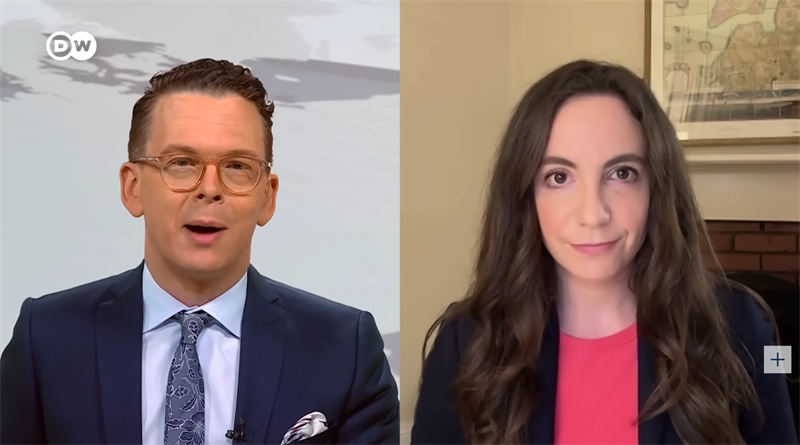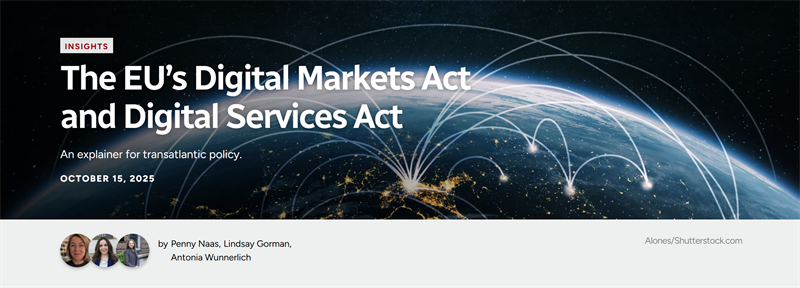TransatlanTech Insider—October 2025 Edition
Welcome to the October edition of the TransatlanTech Insider.
In the United States, OpenAI’s Sora 2 video-creation software brings to life the democratic doomsday scenarios predicted over the last five years. A fake video of a man shoving ballots into a mailbox, fake bombs exploding over cities, and Sam Altman shoplifting at Target are a few of the widely proliferating AI videos from Sora 2, which hit over a million downloads within five days of the software’s launch. The app includes some restrictions, such as on deepfaking likenesses of public figures without permission, and generates a watermark. However, early efforts to overcome these guardrails—from AI videos of Breaking Bad star Bryan Cranston to explicit Sora watermark-removal tools—have succeeded handily.
Brussels is determined to catch up with the AI frenzy. With under 14% of European companies deploying AI last year, the European Commission this month released its $1.1 billion Apply AI Strategy to drive adoption across ten critical industrial sectors: healthcare and pharmaceuticals; mobility, transport, and automotive; robotics; manufacturing, engineering, and construction; climate and environment; energy; agri-food; defense, security, and space; electronic communications; and cultural, creative, and media. European AI advanced healthcare screening tools, industrial data pools for manufacturing, and sectoral AI skills training are all envisioned in the Strategy, which aims to increase EU technological sovereignty and promotes a “buy European” approach to AI adoption.
This month, we share work on the EU’s Digital Markets Act and Digital Services Act in the transatlantic crosshairs, the nexus of space and emerging technology, the future of EU green industrial policy, and the transatlantic implications of US military AI moves. Subscribe to receive future newsletter editions, follow us on X, and visit our webpage to learn more.
Media Spotlight
Lindsay Gorman Featured on DW News on President Trump’s Executive Order on TikTok

Lindsay Gorman was featured on DW News in “Trump signs executive order on TikTok sale” after President Trump delayed TikTok ban enforcement for a fourth time and signed an executive order outlining the terms of a deal to bring the app under majority US ownership. Gorman identified control of TikTok’s algorithm as a key sticking point of the deal. While early details show that US owners will oversee content moderation, she said, the potential licensing of the algorithm from ByteDance raises questions about who truly controls the content that TikTok users see.
Featured This Month
Program Manager and Fellow Julia Tréhu Offers Recommendations for EU Green Industrial Policy

In her new piece, “A Green Industrial Policy for an Era of Economic Security”, Tréhu examines the future of EU green industrial policy in a shifting geopolitical landscape. She assesses the current state of the bloc’s policy and evaluates both global and intra-European obstacles to decarbonization amid the EU’s push to update its economic security strategy. Tréhu offers five recommendations to ensure that EU investments and policies to promote clean technologies are fit for purpose, providing a roadmap for strengthening competitiveness and bolstering strategic readiness without sacrificing EU climate targets.
Lindsay Gorman Breaks Down the Transatlantic Kerfuffle over the EU’s Digital Markets Act and Digital Services Act

“The EU’s Digital Markets Act and Digital Services Act: An Explainer for Transatlantic Policy”, a new piece by Acting Senior Vice President Penny Naas, Lindsay Gorman, and Resident Junior Fellow Antonia Wunnerlich, analyzes the two landmark EU digital regulations in the context of transatlantic trade and technology tensions. The DMA and DSA have become an increasing source of discord in the transatlantic relationship, the authors write, with major US actors across government and industry citing the acts as onerous, technically challenging, and unfair to US firms. EU actors see the legislation as fundamental to the digital society they seek. Naas, Gorman, and Wunnerlich map DMA and DSA provisions and enforcement mechanisms, discuss recent investigations of US technology firms, and analyze key points of disagreement. The authors conclude by comparing EU and US approaches to digital regulation and charting a path forward on transatlantic technology policy cooperation.
GMF Technology Publishes New Pieces on US Military AI and Space Applications of Emerging Technologies

Senior Officer Sharinee Jagtiani and China Technology Analyst Dylan Welch explored new frontiers for emerging technology applications in short pieces for GMF. In “From Divergence to Cooperation”, Jagtiani analyzes US and European approaches to military applications of artificial intelligence. Comparing the US AI Action Plan to European strategy documents, she notes that the United States outpaces the continent on plans to accelerate military AI adoption while Europe leads on responsible use guidance. Jagtiani argues that addressing these divergent foci and leveraging complementary strengths is essential if the transatlantic alliance is to build effective cooperation in this emerging domain.
Welch’s new piece, “Powering the Next Space Age”, examines the role of emerging technology in a new space race toward a cislunar economy: economic activity spanning Earth, the moon, and the space between. He highlights AI, quantum technologies, and biotechnologies as key enablers of future cislunar activity, analyzing the cutting-edge functions each technology can provide. Welch positions the pursuit of a cislunar economy as part of strategic competition with the People’s Republic of China (PRC), which holds its own cislunar ambitions, as well as an essential area for transatlantic cooperation. Allies, he argues, should leverage their complementary strengths and reduce barriers to integrating advanced capabilities to compete in this vital new arena.
Byte-Sized Bulletin
AI and Democracy
- An alleged Russian disinformation campaign involving AI-generated videos and an extensive propaganda network on popular social media platforms sought to undermine Moldova’s pro-European Party of Action and Solidarity (PAS) ahead of the country’s September 28 parliamentary election. PAS nevertheless won a majority in an election many saw as a competition between Europe and Russia.
- California Governor Gavin Newsom signed into law the Transparency in Frontier Artificial Intelligence Act, which requires companies creating advanced AI with annual revenues of more than $500 million to publicly disclose their safety protocols and report incidents to California’s Office of Emergency Services. The law adds to a growing body of state-level AI regulation defining the contours of US AI governance in the absence of comprehensive federal AI legislation.
- OpenAI introduced parental controls for ChatGPT intended to allow parents to oversee their teens’ accounts and receive notifications of potential self-harm. The decision comes as the company faces a lawsuit alleging that ChatGPT contributed to the suicide of a 16-year-old boy.
- The PRC is curtailing the use of telecommunications equipment from Finland’s Nokia and Sweden’s Ericsson, two people familiar with the matter told Financial Times. The two companies’ contracts must undergo often lengthy reviews by the Cyberspace Administration of China as Beijing seeks to reduce its technological dependence on the West.
- US President Donald Trump signed an executive order paving the way for a TikTok deal in which the PRC parent company ByteDance and its affiliates own less than 20% of the app. Vice President JD Vance said the deal will allow TikTok’s US investors to control the app’s algorithm, although lawmakers, including House China Committee Chair John Moolenaar, have voiced concern that ByteDance may retain influence.
- The PRC’s DeepSeek launched its newest AI model, DeepSeek-V3.2-Exp, an experimental version of the current V3.1-Terminus model. The model uses a sparse attention technique to improve efficiency while halving the cost of running it, the Hangzhou-based company said.
- Multinational automaker Stellantis, which owns brands such as Jeep, Maserati, and Doge, will expand its partnership with French AI company Mistral, a start-up seen as one of Europe’s most promising artificial intelligence firms. The companies will launch two new platforms to scale Stellantis’ AI adoption.
- NVIDIA announced plans for a $500 million data center in Armenia in partnership with the AI firm Firebird and the Armenian government, marking a major development for AI infrastructure in the Caucasus.
- Major European airports, including Brussels, Berlin-Brandenburg, and Heathrow, faced operational disruptions after a suspected ransomware attack on third-party check-in and boarding systems provided by the US company Collins Aerospace. The United Kingdom’s National Crime Agency arrested a man in West Sussex, England, in connection with the attack, although the investigation is ongoing.
The Download
- Sharinee Jagtiani spoke on a panel on the geopolitics of emerging technology at the annual Richard von Weizsäcker Forum, organized by the Robert Bosch Academy in Berlin.
- Sharinee Jagtiani spoke at a closed-door session at the German Parliament, organized by the German Council on Foreign Relations, on prospects for German-Indian cooperation in the Indo-Pacific on technology and other critical areas.
- Senior Program Coordinator Adrienne Goldstein hosted Ambassador Roderick Moore, currently a professor of practice at Arizona State University (ASU), and a group of students from ASU’s master’s program in international affairs and leadership to deepen students’ understanding of democracy-affirming technologies, China’s global digital footprint, and transatlantic AI policy and innovation.
GMF Technology is dedicated to ensuring that democracies together win the strategic technology competition with autocrats.
Alexandra Pugh coordinated this month’s TransatlanTech Insider.

